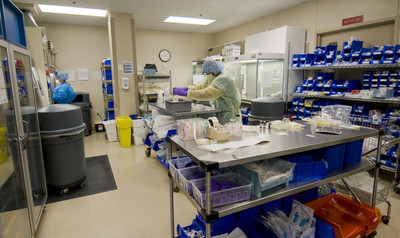Partnership gives cancer patients more help
When University Medical Center's outpatient cancer treatment program was shuttered in November because of severe budget cuts, uninsured and under-insured cancer patients were afraid their only realistic chance at life had disappeared.
Their stories were so heart- rending they moved beyond local news outlets and were eventually portrayed on "60 Minutes."
Now, however, a unique new partnership forged by UMC and the Nevada Cancer Institute means that beginning next year those with modest financial resources no longer have to be concerned they will have nowhere to go for cutting-edge cancer care and clinical trials.
"It is a long-term solution that will allow cancer patients to have a one-stop shop for cancer treatment," Clark County Commissioner Rory Reid said Wednesday. "This is something that Southern Nevada can be proud of."
Under the new agreement, Nevada Cancer Institute will lease space at UMC to open a satellite center there. The arrangement not only will reinstate outpatient chemotherapy treatments at the county hospital but provide paying and nonpaying cancer patients with radiation oncology, imaging and support services and some inpatient care at the same facility.
"We have worked this out so it can essentially support itself," said Dr. John C. Ruckdeschel, who recently was named Nevada Cancer Institute's CEO.
Ruckdeschel created a similar partnership model in Florida as president and CEO of the Moffitt Cancer Center and Research Institute in Tampa.
"The important thing to remember is that we are not just restoring what was at UMC before. We're taking the treatment to a significantly higher level," he said.
UMC and institute officials are scheduled to announce the new program during a news conference today.
One of the keys to the financial viability of the new program, Ruckdeschel said, is the new radiation oncology treatment to be offered by Nevada Cancer Institute.
That service, he said, receives reimbursement revenue from insurance companies and government health programs at a rate that helps pay for expensive drugs for the uninsured.
The new clinic will be built in what is now the admissions department on the first floor of the main hospital building. The 6,000-square-foot space will be renovated with a $3 million donation from The Lincy Foundation, a philanthropy begun in 1989 by billionaire Kirk Kerkorian, the controlling shareholder of MGM Mirage and a longtime supporter of the Nevada Cancer Institute.
"We did this because we have a concern and drive to improve health throughout Nevada, particularly Southern Nevada," said Dr. Jeffery Wilkins, a spokesman for the Lincy Foundation. "We want to be sure more people have access to quality care."
Jack Kolosky, chief operating officer of the Moffitt Cancer Center, said Wednesday that the situation Ruckdeschel walked into in Tampa in the 1990s was much the same as what is happening in Las Vegas.
He said Ruckdeschel brought the Tampa cancer center into a partnership with Tampa General Hospital in 1999 when the public facility was struggling financially to provide cancer treatment.
"We saw that we could open a clinic so people wouldn't have to trek the 15 miles to Moffitt," he said. "It became a win-win for the Moffitt, Tampa General and, most of all, the patients. What was a struggling program became a profitable program."
John Dunn, a spokesman for Tampa General Hospital, said Wednesday that the hospital "had some financial issues back then" with its cancer program but now is in "excellent shape" after entering into the partnership with Moffitt.
The new agreement between UMC and Nevada Cancer Institute comes about six months after both parties announced that their earlier contract would end at the end of 2008 instead of in 2010.
Under the contract, the cancer institute's physicians as subcontractors provided inpatient and outpatient care to UMC patients.
UMC Chief Executive Officer Kathy Silver said Wednesday the decision to end outpatient cancer care came after UMC was expected to lose about $20 million in revenue because of statewide cuts in Medicaid reimbursements.
Ruckdeschel described the earlier contract that UMC and the Nevada Cancer Institute entered into as not well thought out.
He said services that the institute ended up providing went beyond the terms of the contract and caused severe financial losses, but he would not say how much. That contractual agreement had the institute receiving about $60,000 a year.
He said both sides were right in ending the contract because of financial issues, but "those two rights ended up in a terrible wrong."
Ruckdeschel said he expects two medical oncologists and a radiation oncologist from the institute to be at UMC full time.
He said costs for staff could potentially be divided between the institute, UMC and the Nevada School of Medicine. He also said institute specialists in cancer treatment areas that include breast, colon and lung cancer will regularly rotate through the hospital.
Neither Ruckdeschel nor Silver said they could divulge precise financial outlays for the partnership because those details are still being hammered out.
Ruckdeschel said he thinks that the country will produce some health reforms in the near future and that he suspects that some patients brought into UMC in the past as nonpaying could actually be eligible for financial aid from a variety of resources.
He isn't sure, he said, that all of the groundwork has been done at intake to find all of the financial aid programs that are available for patients.
The mix of paying and nonpaying patients might well go up at UMC, Ruckdeschel said.
In Tampa, he said, once patients realized that programs offered at Tampa General offered the same treatment as Moffitt, they would go to whichever facility was closest to their homes.
Reid was ecstatic Wednesday with the new partnership.
"Unlike the governor and the Legislature, we have worked something out here for the long term," he said.
Contact reporter Paul Harasim at pharasim@reviewjournal.com or 702-387-2908.

















